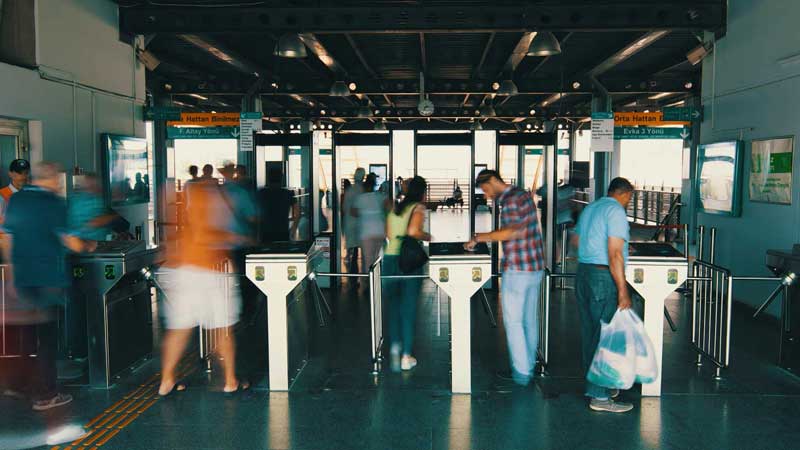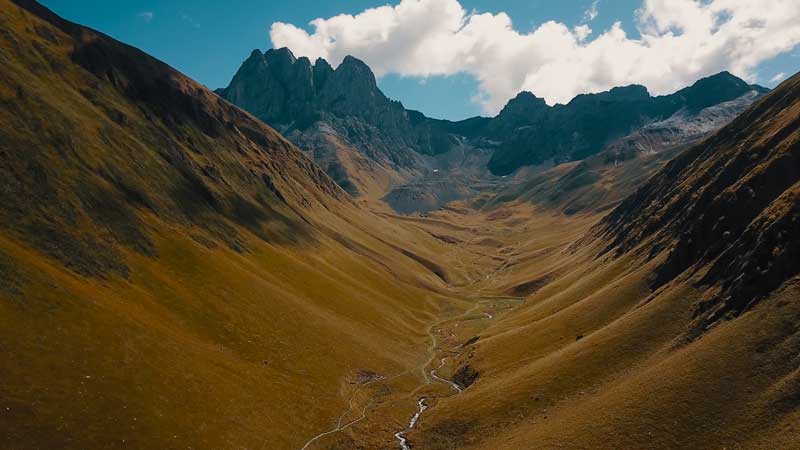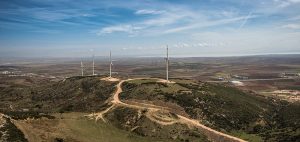Impact inside the EBRD
Sustainability from within
Introduction
We believe in holding ourselves to the same high standards we expect of others. We are constantly evaluating the sustainability of our internal operations. We strive to minimise our environmental impact and to increase awareness among staff about sustainability. As an institution, we also recognise the companies that we believe have made the biggest contributions to promoting environmental and social sustainability in our annual EBRD Sustainability Awards.
The Edincik wind farm
The 77.4 MW Edincik wind power project is located on the southern coast of the Sea of Marmara, Turkey. The project was all financed through Isbank using Mid-size Sustainable Energy Financing Facility (MidSEFF) funding. In total, an estimated 254.5 GWh is expected to be generated annually, reducing GHG emissions by 147,510 tCO2/year. The project also contributes to social and economic development through education, sanitation, job creation, technology transfer and improved agricultural production.
Carbon neutral
Introduction
In July 2018 we became a carbon-neutral institution by off-setting the greenhouse gas (GHG) emissions of all our own internal operations, including office buildings and flights. We purchase carbon credits from a Gold Standard-certified Turkish renewable energy project, the Edincik wind farm, which we helped finance in 2012.
“The EBRD is committed to reducing emissions from its own operations, as well as helping its public and private sector clients reduce theirs … We are now purchasing carbon credits to cover emissions from the Bank’s operations and becoming carbon neutral. I am pleased that the first project to offset emissions resulting from our own operations is a project in Turkey, where the EBRD is the leading financier of sustainable energy.”
Suma Chakrabarti, President of the European Bank for Reconstruction and Development
Consumption and recycling figures
Not only have we fully offset our carbon emissions, we also source all electricity for our London Headquarters (HQ) from renewable energy suppliers. Our office paper is certified by the Forest Stewardship Council® (FSC) as coming from sustainable sources. Our 2018 results show we have reduced our paper use alone by 50 per cent since 2013, saving over five tonnes of paper over that period. Our HQ catering team’s food waste ratio sits at 3 per cent (against an industry average of 5 per cent).
There is also a strong emphasis on waste recycling, reducing the use of plastic bottles and sourcing environmentally friendly merchandise. This year, our staff formed a Sustainability Working Group to drive more green engagement throughout the Bank and promote the initiatives of our internal operations teams to that end. This has resulted in increased recycling, uptake of reusable cups and water bottles and more awareness of energy efficiency within our offices.
| 2015 | 2016 | 2017 | 2018 | |
|---|---|---|---|---|
| Electricity (GWh) | 14.5 | 14.8 | 14.8 | 14.8 |
| Gas (GWh) | 3.4 | 4.3 | 3.8 | 4.2 |
| Water (thousands m3) | 47.9 | 42.2 | 42.5 | 48.1 |
| Energy CO2 emissions (kt)* | 7.8 | 6.9 | 5.9 | 4.2 |
| Travel CO2 emissions (kt) | 7.1 | 7.7 | 6.2 | 7.2 |
| Printer paper consumption (tonnes) | 58.3 | 49.5 | 39.5 | 33.1 |
| Material recycling (tonnes) | 112.4 | 72.8 | 105.4 | 99.1 |
*CO2 data are compiled using the latest UK government conversion factor recommended for GHG reporting. For 2018 the conversion factor of 0.28307 kg CO2 per kWh is used for grid electricity and 0.184 kg CO2 per kWh is used for consumption of natural gas. The decrease in energy-related CO2 emissions reflects the reduction in UK grid emission intensity over recent years.
Staff gender breakdown
The EBRD is a responsible employer and is committed to promoting gender equality among its own workforce. In 2017 the EBRD partnered with EDGE (Economic Dividends for Gender Equality), the leading provider of business certification for gender equality, in order to measure and benchmark our policies and practices concerning gender equality. Together with EDGE we identified areas for improvement in our policies and practices and an action plan was developed.
As part of this commitment we are providing details of EBRD staff representation by gender. Women make up more than half of EBRD staff but represent a lower percentage of more senior job bands.
In partnership with EDGE we also carried out an analysis of our gender pay gap. This analysis shows that, when looking at equal pay for equivalent work, there are no statistically significant differences between men and women at the same pay grade at the EBRD. The Bank is working proactively to address gender representation through mentoring, coaching, succession planning and the promotion of flexible working arrangements. The Bank’s Strategic Implementation Plan 2018-2020 sets an aspiration of having women in half of all corporate leadership group roles. We are already seeing the positive impact of these efforts.
Green Week
Our Green Week in November, which coincided with the European Week for Waste Reduction, aimed to showcase our green impact and promote a sustainable lifestyle generally. Staff were asked to consider their own carbon footprint and to incorporate sustainability practices such as avoiding single-use plastics, recycling, saving energy and reducing waste. They were encouraged to take the stairs instead of the lift, ensure computer monitors were turned off at night, and to use reusable cups in the coffee bar. A prize went to the staff member with the lowest carbon footprint.
Our initial records show that recycling during Green Week doubled to 56 per cent, up from 25 per cent.
Our printing services team took part in a Tree Planting Day with Ricoh, our inhouse printing supplier, where over 1,000 trees were planted as part of the Woodland Trust scheme. This will go towards absorbing and capturing CO2 emissions to protect our environment and to replenish stock levels and off-set our carbon footprint.
Recycling during Green Week doubled
Woodland Trust scheme
EBRD Community Initiative
Our Community Initiative, which has been running since 2016, gives EBRD staff an opportunity to get involved in philanthropic, social and cultural activities in the economies where we work. Our latest call for proposals in October 2018 resulted in 10 new applications with pledges of over €180,000, bringing the total number of staff applications approved to 46.
Fundraising campaigns have included charitable concerts, auctions, exhibitions of crafts and arts from the region, personal challenges and bake sales. In 2017-18, five fundraising teams went above the maximum threshold of €50,000 for a matching contribution from the EBRD and two teams raised amounts close to it.
To date, the Community Initiative has supported charitable organisations in Armenia, Bulgaria, Croatia, Egypt, Georgia, Greece, Hungary, Kazakhstan, Kosovo, Kyrgyz Republic, Moldova, Mongolia, Morocco, Romania, Russia, Tajikistan, Turkey and Ukraine.




